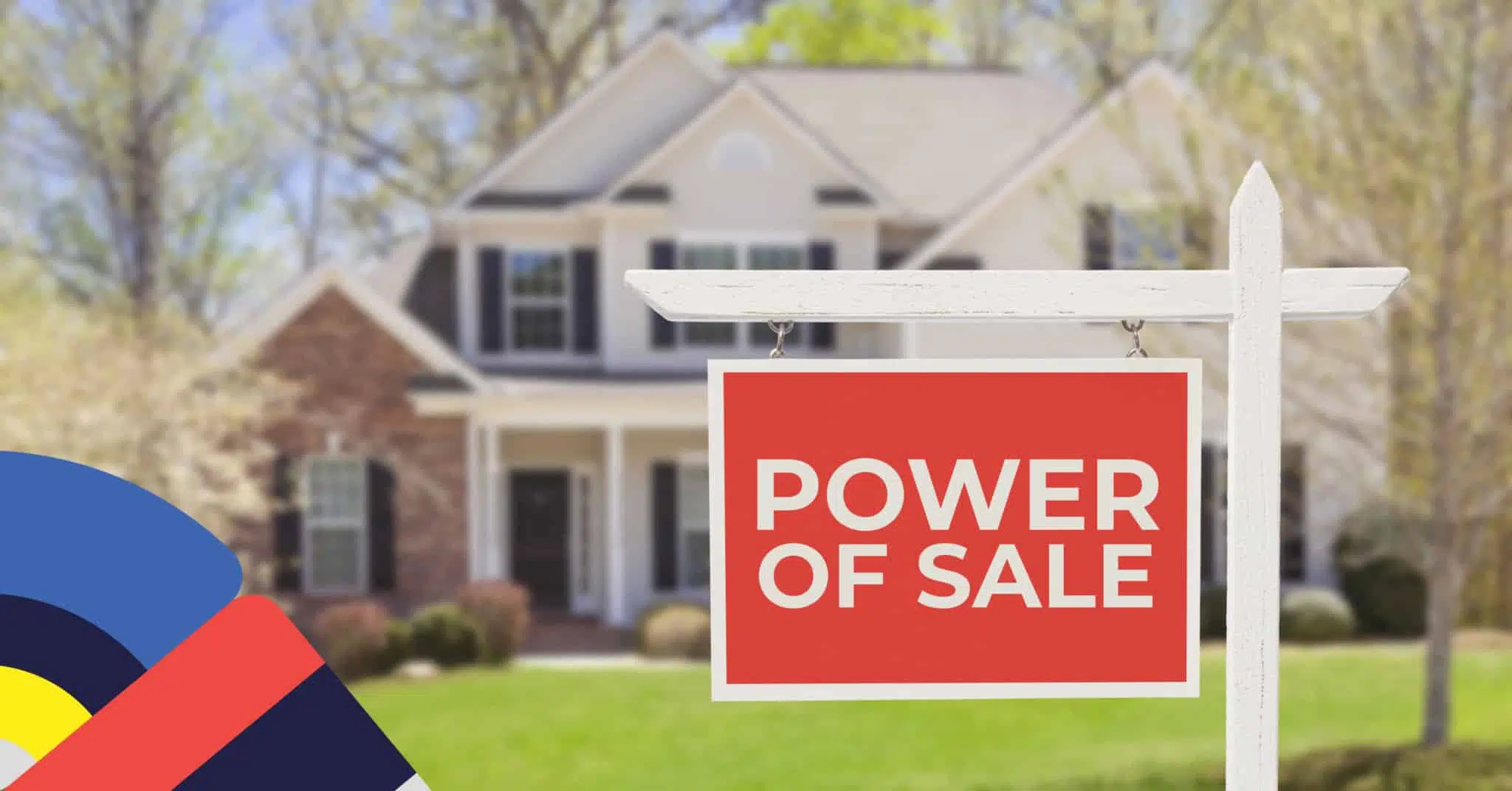What Is A Power Of Sale For A Mortgage in Canada?

Table of contents
Purchasing a home with a mortgage requires that you make monthly mortgage payments as well as live up to other stated terms in the agreement.
However, sometimes homeowners are unable to either make mortgage payments or repeatedly flout some other terms of the agreement. In such a scenario, the lender may opt to possess and sell the house using a power of sale.
So, what is power of sale, and what is power of sale homes?
Key Takeaways:
- A power of sale grants a lender the authority to possess and sell a property after the borrower has defaulted on their mortgage
- Power of sale and foreclosure work similarly, with the major difference being courts involvement and obligation of the lender to the borrower after the home sale
- Power of sale works differently in various provinces in Canada in terms of conditions to be met and duration before enforcement
- You can stop or prevent the power of sale by remortgaging, selling your home, negotiating with your mortgage lender, amongst others
What is Power of Sale?
A power of sale virtually grants the lender the authority to take possession of the house and sell it off in the event that the borrower defaults on their mortgage. This power is typically included as a clause in the mortgage agreement between the lender and borrower.
Usually, prior to taking drastic action like beginning a power of sale process or foreclosure, the lender would reach out to the homeowner, notifying them of the default and demanding that they make good on the outstanding mortgage balance as well as any tax arrears by a specified date. If the homeowner fails to make payment by this date, the lender can then resort to a power of sale or foreclosure depending on the province where the home is located.
Beyond missing monthly mortgage payments, homeowners may default on their mortgage by breaking loan covenants or neglecting their obligations as stated in the agreement. This could include skipping property tax payments or failing to maintain the property to uphold its structural integrity. Failure to do these is tantamount to defaulting on the mortgage as well. This makes for a scenario where a power of sale example can be made.
In provinces like New Brunswick, PEI, Newfoundland, and Ontario, power of sale is a more rapid process and presents a swift solution that prevents having to involve courts as against if a foreclosure had been opted for.
Foreclosure vs. Power of Sale: Key Differences
A power of sale can be regarded as being similar to a foreclosure if viewed from the mortgage angle, and it is therefore not uncommon to find them used interchangeably. At other times, a term like power of sale foreclosure is often used.
The proceedings of a mortgage foreclosure see the lender possess the property and become the sole owner. In the event of a resale, the lender bears no obligation to the homeowner with regards to the sales process; the borrower has no business with the property anymore.
For power of sale, on the flip side, the lender is mandated to sell the property for the highest price that they can get. Funds gotten from the sales go towards wiping off the entire debt slate, including the outstanding mortgage balance, interest arrears, or any commissions. When all defaulted-on payments have been covered, the homeowner gets whatever funds are left (if any), and the lender holds on to the title.
Similarly, if the property sells for less than what the borrower’s debt tab reads, the borrower is held responsible for the balance and can be sued.
This is the major difference between foreclosure and power of sale. However, some other factors slightly differ for both processes:
| Foreclosure | Power of Sale |
| Process is lengthy | Process is Rapid |
| Borrower receives nothing from property sale | Borrower receives any funds left over after all debts have been paid |
| Borrower has no responsibility to repay any outstanding mortgage amount | Borrower has a responsibility to pay back any outstanding balance not covered by property sale and can be sued |
| Quebec, British Columbia, Alberta, Manitoba, Saskatchewan, Nova Scotia, and the 3 territories | Ontario, PEI, New Brunswick, and Newfoundland and Labrador |
Foreclosure vs. Power of Sale: Which is a Better Option?
While neither a foreclosure nor a power of sale seems like a palatable situation, one might still be a lesser evil. Determining which is a better option between foreclosure vs. power of sale depends on two base factors:
- Your outstanding mortgage balance
- The present market value of your home
A foreclosure can prevent you from further debt payment to your lender if the value of your home has seen a significant decline. However, a significant increase in your home’s value also sees you getting nothing in the way of profit.
Here’s a practical example for a mortgage: if your mortgage has an outstanding balance of $250,000 and the lender opts to foreclose the home and then sells it off for $200,000, the $50,000 lost by the lender is not your responsibility, and you cannot be sued for this, and vice versa.
A power of sale, on the other hand, allows you to receive the balance from the sale of your home after your debt has been paid off. For instance, if your home is now worth about $500,000 and you default on a $350,000 mortgage. The lender sells at the market price of $500,000, hypothetically incurs $40,000 in selling costs, including commissions and legal fees. After deducting the loan balance and selling costs ($390,000), the outstanding balance ($110,000) goes to you.
Homeowners slapped with a power of sale typically owe more than the present value of the house. In other words, an underwater mortgage with an outstanding balance of, say, $400,000 on a home with a present value of $250,000 would not see the homeowner receive any payment. Rather, the lender would sue the homeowner to recoup the portion of the debt that the property sale could not cover, including the selling costs incurred.
Mortgage payment plans aren’t meant to be one-size-fits-all.
Chat with a nesto mortgage expert & get a mortgage payment fit to you.
Should I Purchase a Power of Sale Home in Canada?
A “power of sale” home on the market doesn’t necessarily mean a discount deal. This is because after possessing the property, lenders are required to sell the house for the present market value. In other words, the house would not sell for a giveaway price.
Similarly, something else to note is that the house would be sold “as is.” In essence, the seller would neither take care of any renovations nor affect any repairs; whatever issues with the house would be the responsibility of the buyer to fix. In addition, the lender would not have any concrete or detailed information about the house like the owner would have.
So, if you’ve figured out how to find a power of sale home in Ontario and you have your sights set on one, you should know about these potential problems before going along with the mortgage sales process.
Before considering a power of sale houses in Toronto, Ontario, be certain that you fully understand what you’re getting into.
Power of Sale by Province: When Can a Home Be Sold?
Here’s a summary of power of sale periods by province:
| Province | Possible Sale Period |
| Ontario | 45 days post notice |
| Prince Edward Island | Varies |
| New Brunswick | Two weeks post notice |
| Newfoundland and Labrador | Two weeks post notice |
Power of Sale in Ontario
Power of Sale Ontario is guided by the Mortgages Act of Ontario, which details that the lender reserves the right to sell mortgaged property at any point in time if the mortgage has been defaulted on for three months.
The lender is required to notify the homeowner in written form a minimum of 45 days before any sale. The Notice of Sale in writing can be handed to the homeowner at any point in time once they have defaulted on their mortgage for 15 days.
Power of Sale in PEI
Prince Edward Island’s Real Property Act requires that a predetermined number of weeks have elapsed after the homeowner has been notified before the lender can execute a power of sale. The length of time is usually detailed in the deed of conveyance, and said notice could either be delivered to the borrower, sent via mail, or published in any newspaper circulated in Prince Edward Island.
Power of Sale in New Brunswick
The Property Act in New Brunswick would only permit a power of sale after the homeowner has been given written notice informing them about the proposed sale, as well as the time and location where the sale would take place. This notice of sale would also have to be consecutively published for at least two weeks in a newspaper that is located in the same county as the home.
Power of Sale in NL
The mortgage lender is mandated to deliver a written notice to the borrower according to Newfoundland and Labrador’s Conveyancing Act. A Notice of Sale can then be published by the lender if the homeowner still defaults 30 days after receiving the notice.
Three salient criteria must be met here:
- The newspaper carrying the notice must be distributed in the home’s area
- The publication must be done for two consecutive weeks before the date of sale
- Following a home appraisal, the sales price cannot be less than 75% of appraised home value
The sales date on the notice is similar to the foreclosure sale date meaning the date on which a foreclosed property would be sold.
What Can Borrowers Expect from a Power of Sale?
Lenders are usually quite flexible and willing to cut deals with a homeowner who has fallen behind on mortgage payments. This is because a power of sale process, while not as prolonged as a foreclosure, still takes time and is quite complicated.
Once you have defaulted on your mortgage, contact your lender immediately to potentially stop power of sale and explore possible avenues to allow both parties to achieve their goals (your lender getting their payment and you keeping your home).
Alternatively, you could try to remortgage with another lender. You can pay off your initial mortgage and as well as other debts incurred alongside. A new mortgage may allow you to reduce your monthly payment or even get a longer amortization period.
Similarly, if you have sufficient equity, you may consider selling your house before you start defaulting. If you sell your house, what happens to the mortgage? Your mortgage lender gets paid by the buyer’s funds, and you are in the clear. And can I still sell my house in foreclosure? Yes, you can wait up until the date that it is auctioned. The mortgagee sale owners’ rights allow this.
Final Thoughts
Experiencing a power of sale is definitely not any homeowner’s dream, but it does happen sometimes. This dicey situation can be prevented or forestalled by taking various measures like negotiating with your mortgage lender, remortgaging, or selling your home, depending on which works best.
Ready to get started?
In just a few clicks, you can see our current rates. Then apply for your mortgage online in minutes!















